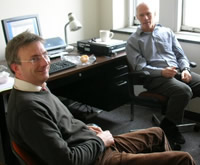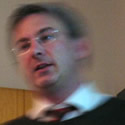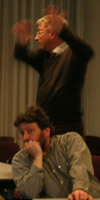Tuesday, 21 March 2006
A Friend Returns
 It
is always a happy occasion when a Visiting Fellow returns to visit.
Today Stephan Hartmann, who had been a Visiting Fellow in 2000-2001,
was back in town, giving talks here and in the Philosophy Department
at CMU. The topic was a big one and the room was full. Just how
are we to make progress in philosophy of science? The deep truths
we seek are so elusive. Perhaps, Stephan wondered, we can make progress
by mimicking what has worked well in science itself. There the final
truths are often hidden from us, but we make progress by working
with a model. We know the model is limited and inadequate. There
are no masses of point size that can be projected into airless space
after sliding frictionlessly over a perfectly smooth inclined plane.
Nonetheless we seem to get lots of useful results about real things
like ski jumpers by imagining that there are such things and computing
how they would behave. It
is always a happy occasion when a Visiting Fellow returns to visit.
Today Stephan Hartmann, who had been a Visiting Fellow in 2000-2001,
was back in town, giving talks here and in the Philosophy Department
at CMU. The topic was a big one and the room was full. Just how
are we to make progress in philosophy of science? The deep truths
we seek are so elusive. Perhaps, Stephan wondered, we can make progress
by mimicking what has worked well in science itself. There the final
truths are often hidden from us, but we make progress by working
with a model. We know the model is limited and inadequate. There
are no masses of point size that can be projected into airless space
after sliding frictionlessly over a perfectly smooth inclined plane.
Nonetheless we seem to get lots of useful results about real things
like ski jumpers by imagining that there are such things and computing
how they would behave.
So Stephan wants to try the same thing in philosophy of science. He has long investigated so-called Bayesian epistemology. The central idea is that our beliefs come in degrees that behave like probabilities and that we change beliefs by updating using Bayes' theorem. The great appeal is that big questions about how we learn about the world can be reduced to mechanical computations with probabilities. Of course the big worry is that the aura of certainty of a computation might make us lower our normal critical scrutinies.
 Now
Stephan wants to go beyond what he disparages as "text-book
Bayesianism" to "naturalized Bayesianism." The danger
of text-book Bayesianism is that it deals with cases so over-idealized
that they make no contact with the real world. At the other extreme
is the danger of the perfectly fastidious description that tells
us so perfectly and completely about one case that we learn nothing
applicable to any other. Now
Stephan wants to go beyond what he disparages as "text-book
Bayesianism" to "naturalized Bayesianism." The danger
of text-book Bayesianism is that it deals with cases so over-idealized
that they make no contact with the real world. At the other extreme
is the danger of the perfectly fastidious description that tells
us so perfectly and completely about one case that we learn nothing
applicable to any other.
Stephan has the compromise. He want to augment text-book Bayesianism with just enough contact with the real world so that it resembles something more real while still offering general morals. For example, he takes the text-book analysis of our intuition that it is better to have a variety of different evidence. He adds to it the fact that instruments that give us evidence are not always reliable. Out comes a new result borne of the new attention to realism: if the instruments are not very reliable, it turns out to be better not to vary evidence, but to repeat the same measurement in order to gain the benefits of coherence from repetition.
 The
talk goes for an hour--longer than most. But Stephan is determined
to give us the full story. We have our five minute break. The bagels
are gone, but there are donuts and coffee left. Now to questions.
Hasn't Stephan fallen into the trap of letting a nice calculation
think for him? The calculations are lovely, but what has surprise
got to do with confirming evidence; and are correlations among evidence
the same as lack of variety of evidence? And is naturalized Bayesianism
really different from text-book Bayesianism? Stephan is becoming
engrossed and before long he has wandered all the way to the back
of the room, answering questions and waving his arms. The
talk goes for an hour--longer than most. But Stephan is determined
to give us the full story. We have our five minute break. The bagels
are gone, but there are donuts and coffee left. Now to questions.
Hasn't Stephan fallen into the trap of letting a nice calculation
think for him? The calculations are lovely, but what has surprise
got to do with confirming evidence; and are correlations among evidence
the same as lack of variety of evidence? And is naturalized Bayesianism
really different from text-book Bayesianism? Stephan is becoming
engrossed and before long he has wandered all the way to the back
of the room, answering questions and waving his arms.
John D. Norton
Stephan Hartmann
London School of Economics and UC Irvine
21 March 2006
:::
Modeling in Philosophy of Science
:::
Lunchtime Colloquium
|


![]()
![]()


